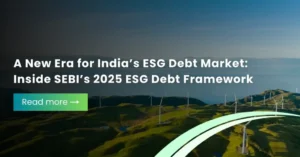Sustainable finance in India is entering a new phase, one...


Make a Sustainable Impact
Get Started with SAMESG®
In recent years, the relevance of sustainability has grown more than ever, from a fancy word to a regulatory priority. With increasing investor pressure, stakeholder scrutiny, and evolving climate risks, sustainability reporting is now a strategic and compliance necessity for businesses.
Singapore has made an important leap in the development of ESG disclosure through three key regulatory bodies, the Accounting and Corporate Regulatory Authority (ACRA), that oversees financial reporting and corporate disclosure, the Singapore Exchange (SGX), that sets sustainability reporting requirements for listed companies; and the Monetary Authority of Singapore (MAS), that regulates the financial sector and promotes sustainable finance. Together, they have formed the Sustainability Reporting Advisory Committee (SRAC), which lays the foundation for a unified, standards-aligned ESG reporting landscape that applies to both listed companies and large non-listed entities.
Businesses operating in Singapore are now expected to approach ESG not just as a responsibility, but as a core part of governance and transparency. To support this shift, SGX has introduced a “comply or explain” approach, while ACRA has moved towards aligning sustainability disclosures with the global ISSB standards.
This blog explores the sustainability reporting frameworks enforced by ACRA and SGX, the implications, and what businesses should know to stay compliant in a fast-evolving ESG ecosystem.
The Singapore Exchange (SGX) mandates all listed companies to issue annual sustainability reports, introduced in 2016 under the “comply or explain” framework. This means that while disclosure is expected, companies may explain any omissions, provided they offer a valid justification.
SGX has mandated sustainability disclosures for all listed companies since 2017 under its ‘comply or explain’ framework. Beginning from the financial year 2025, climate-related disclosures aligned with the TCFD recommendations have become mandatory for listed issuers in key sectors such as finance, agriculture, food, and energy. Other sectors are scheduled to be phased in over subsequent years, in line with SGX’s roadmap toward full climate-related reporting coverage.
These disclosures must follow the Task Force on Climate-related Financial Disclosures (TCFD) guidelines, which includes:
To build investor confidence, SGX now encourages companies to get key ESG data externally reviewed, and increased board-level oversight on ESG disclosures. In addition to this, SGX has publicly endorsed the ISSB standards (IFRS S1 and S2), signaling a full convergence toward globally aligned sustainability reporting in the near future. While mandatory ISSB adoption is not yet in effect for all, it is indeed essential for the listed companies to future-proof their ESG strategies.
While SGX governs listed companies, ACRA is working closely with the Accounting Standards Council (ASC) and the Monetary Authority of Singapore (MAS) to implement climate-related reporting requirements for large non-listed companies. Based on the recommendations of the Sustainability Reporting Advisory Committee (SRAC), non-listed companies with annual revenue of at least S$1 billion will be required to report climate-related disclosures starting from financial year 2027. ACRA’s role includes overseeing the implementation of these requirements, ensuring alignment with the ISSB standards (IFRS S1 and S2), and preparing private companies for a globally consistent and investor-relevant ESG disclosure regime.
In 2024, ACRA signaled a major transition by supporting the adoption of ISSB’s global sustainability reporting standards (IFRS S1 and IFRS S2) in Singapore. These standards emphasize consistent, comparable, and investor-focused climate and sustainability disclosures across industries. In particular,
From FY 2027, large non-listed firms are expected to obtain external limited assurance on Scope 1 & 2 emissions, while Scope 3 assurance is optional from FY 2029.
By aligning with ISSB standards, ACRA’s goal is to prepare local companies, regardless of listing status for both regulatory convergence and global investor assessment. Moreover, ACRA is focusing on how integrated reporting, which blends financial and sustainability performance, can become part of the broader corporate governance landscape soon.
While both SGX and ACRA are committed to enhancing ESG accountability in Singapore, their mandates vary in scope, target entities, and implementation timelines. SGX primarily governs listed companies and continues to follow a “comply or explain” approach, requiring firms to disclose climate-related risks, governance structures, and sustainability strategies in alignment with TCFD. In contrast, ACRA targets large non-listed entities defined as those with annual revenue => S$1 billion or total assets => S$500 million.
The key difference lies in the level of obligation and standardization. While SGX provides flexibility under its market-based framework, ACRA’s approach is more regulatory in nature, directly integrating sustainability reporting into annual filings and holding non-listed entities accountable to the same level as the listed ones.
In 2025, ESG has become a business necessity integrated into Singapore’s economic and legal framework, not just another box to check. ESG disclosures are widely regarded as markers of long-term value, risk resilience, and governance maturity, regardless of whether a company is privately held or publicly listed.
Both local and international investors are increasingly screening companies based on ESG transparency. Non-compliance or weak disclosures can directly affect investment inflows, lending terms, and valuation.
Businesses that establish robust ESG systems early will be more equipped for future requirements, like integrated reporting and cross-border compliance with EU and other international standards, as Singapore becomes more aligned with global sustainability frameworks.
A pro-sustainability reputation is beneficial to businesses operating out of or growing into Singapore, particularly those seeking partnerships, tenders, or listings in areas with strict ESG standards. On the other hand, noncompliance with ESG standards might lead to exclusion from funding possibilities or supplier lists.
Companies can attain an improved awareness of their governance structures, societal impact, and resource utilization through transparent ESG practices. This improves risk mitigation, particularly in areas like labor practices, regulatory compliance, and climate resilience.
As Singapore aligns itself with global ESG benchmarks, businesses ignoring these mandates risk falling behind their more prepared competitors, both operationally and financially. Non-compliance with SGX or ACRA ESG mandates can lead to the following risks:
Even with clear frameworks from SGX and ACRA, businesses including listed and non-listed continue to face practical barriers in achieving full ESG compliance.
ESG-related data is often fragmented across departments from operations, HR, to legal. A lack of centralized data architecture complicates the process.
Many organizations struggle to define materiality and KPIs that satisfy ISSB (IFRS S1/S2) or TCFD. This lack of clarity impacts the consistency of disclosures.
There may be limited internal ESG expertise or dedicated teams, especially non-listed firms under ACRA, to develop structured, audit-ready reports. This makes it harder to meet upcoming assurance mandates (like Scope 1 & 2 assurance from FY2027).
SGX’s push for board involvement in ESG adds a new layer of accountability, but many organizations are still developing governance mechanisms to manage this shift. ESG often remains disconnected from broader corporate strategy.
Automation platforms like SAMESG ® streamline and strengthen ESG reporting for both SGX-listed companies and non-listed entities under ACRA, providing:
As ESG regulations evolve rapidly in Singapore, and businesses whether listed or privately held can no longer afford to treat sustainability as a secondary function. Both SGX and ACRA have established clear expectations to improve the quality, credibility, and comparability of ESG disclosures across the board. In this scenario, being ESG-ready is no longer just a compliance checkbox, but rather a strategic differentiator that influences access to capital, stakeholder trust, and long-term resilience.
To eliminate manual workload and risk exposure, platforms like SAMESG ® can be adopted, which will enable organizations to centralize their ESG data, align with multiple frameworks, and produce audit-ready reports with speed and accuracy. As ESG readiness becomes paramount, investing in the right digital infrastructure today will define a company’s credibility and competitiveness tomorrow.
Want to know how SAMESG® works?
SAMESG® streamlines ESG reporting—automating data collection, ensuring compliance, and delivering audit-ready reports in one powerful platform.
About the author

Director – Projects & Value Chain at SAM Corporate LLC
Follow the expert:
Rajagopal Kannan is the Director of Projects & Value Chain at SAM Corporate LLC, leading ESG, risk management, and sustainability initiatives. With over 20 years of experience, including a decade in banking and financial risk, he specializes in credit structuring, Basel II & III, ISO 31000, COSO ERM, internal audit, and regulatory compliance under CBUAE, DFSA, ADGM, and SCA.
His current focus lies in ESG integration, climate and sustainability risk management, and value chain sustainability. A GRI-certified Sustainability Professional and GARP-certified SCR holder, he also holds multiple global credentials including PRM®, GRCP, GRCA, CRCMP, CBiiiPro, CSM, and CISI Level 3.
Share
Related Posts
Explore more resources